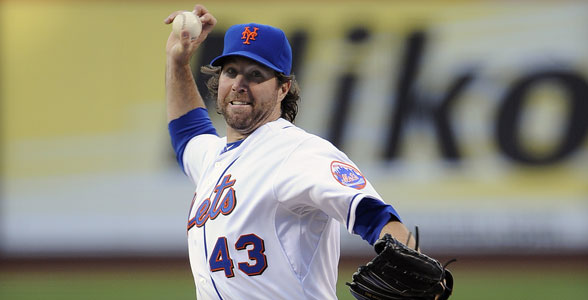By R. A. Dickey
Throwing a good knuckleball is like walking a tightrope.I have been a baseball player for twenty-eight years, the last fifteen of which I have had the blessing of playing professionally. I am currently a pitcher for the New York Mets, and I specialize in throwing the knuckleball. I have had an affinity for literature for an equally long time. I remember writing poetry, albeit the “make a wish with a fish on a dish” type stuff, as early as fourth grade. All this is to say that throughout my career as a baseball player, I have been able to discover a great many similarities between the game of baseball and the written word.
Throwing a good knuckleball is like walking a tightrope. I have dedicated the last five years of my life to that end, and I still wobble and lose my balance, only to throw a beach ball to the hitter and have him promptly deposit it into the left field bleachers. However, when I do get it right, it is an unmistakable sensation. The ball comes out perfectly from beneath my fingernails and has about a quarter of a rotation on it from the time it leaves my hand until the time it gets to the catcher’s mitt. The result is pure euphoria, a ball that looks like a butterfly in a windstorm. No hitter on Earth possesses the skill to hit it squarely. It is analogous to writing a perfect line of poetry. Let us take “The Raven” by Edgar Allan Poe, for example. When I read the line, “And the silken sad uncertain rustling of each purple curtain,” I cannot help thinking that Poe felt the same unequivocal exhilaration that only the perfect mixture of rhyme, alliteration, and meter can produce. In both cases, the product is much more than happenstance: It is the result of dedication, risk, and rhythm. Fundamentally, there is a piece of one’s soul attached to the outcome.
Although I was an English major at the University of Tennessee, I must admit that the bulk of my knowledge, when it comes to literature, is self-taught. I have had some fantastic teachers and professors over my academic career. However, and I am certain of their agreement on this matter, they can only teach me how to get to the precipice of the reading experience. They may tell me of the importance of character development or the significance of philosophical undertones, but until I am able to read the work with my own lens, and unpack it accordingly, it does not become a living thing. And that is the beauty of literature, that it gives us insight into ourselves while communicating a compelling narrative.
Similarly, a coach can only show me the mechanics that might help me succeed, but until I make the technique my own, giving the instruction its own personality and identity, can the wisdom truly flourish. Only when I stopped trying to be Tim Wakefield or Charlie Hough (both very good knuckleballers and equally good mentors) and started being who I was made to be did I begin to have success. Pitching, like writing, is an art. The thing that makes an artist good, more times than not, is technique. It is this developed technique that enables one to reach his or her potential. Consistency cannot be forced, as good writing is not forced. Any artistry is truly an organic experience.
Ultimately, I believe the most fantastic aspect of story is the realization that daily we are writing our own. Every day, a new page is penned. Every relationship is a chance for further character development. As Isaac Bashevis Singer so eloquently put it, “When a day passes, it is no longer there. What remains of it? Nothing more than a story. If stories weren’t told or books weren’t written, man would live like the beasts, only for the day . . .. Today we live but by tomorrow, today will be a story. The whole world, all human life, is one long story.” May that notion be the echo of your spirit as you strive to understand that your one true authentic gift is your story, and that gift is meant to be experienced and shared.
R. A. Dickey, a Nashville native, attended UT Knoxville from 1993 to 1996 and majored in English literature before he was drafted into the major leagues. He was 11-9 as a starter for the Mets last year with an ERA of 2.84.



